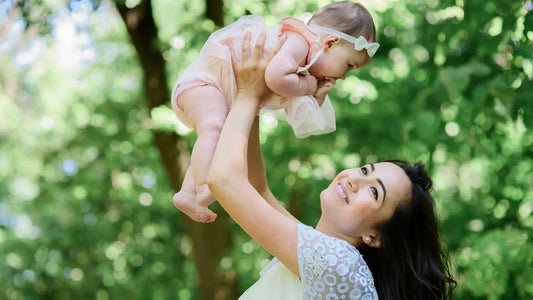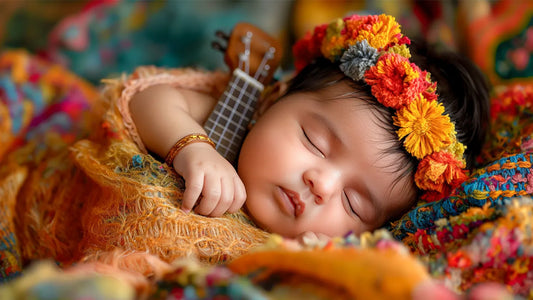Baby’s First Fever: Dos and Dont
The first time your baby gets a fever can be scary. But how do you figure out if it's a serious problem or just a small sickness? If your child's temperature exceeds 99 degrees (oral) or 100.4 degrees (rectal), it indicates the presence of a fever. Newborn Baby Fever can be distressing, but with the right knowledge, recognizing symptoms, and providing comfort, parents can navigate smoothly this common childhood occurrence. In this article, we will explore the dos and don'ts when dealing with a baby's first fever.
Do's:
Monitor the Temperature: The first step is to monitor your baby's temperature regularly. Use a reliable digital thermometer designed for infants and check their temperature by placing it under their armpit. A normal temperature for a baby is between 97°F (36.1°C) and 100.4°F (38°C). If the temperature exceeds this range, it's considered a fever.
Dress Your Baby Comfortably: Dress them in lightweight, breathable fabrics to help regulate their body temperature. Avoid bundling up your baby in heavy layers of clothing, as overdressing can trap heat and exacerbate the fever.
Keep Your Baby Hydrated: Fever can lead to dehydration, so it's crucial to ensure your baby stays hydrated. Offer breast milk frequently, even if they seem disinterested. If your baby has started eating solids, include foods with high water content like pureed fruits and vegetables.
Administer Fever-Reducing Medication if Necessary: Consult your paediatrician before giving any medication to your baby. If the fever is causing discomfort, your doctor may recommend an appropriate infant acetaminophen or ibuprofen dosage. Always follow the recommended dosage instructions and never exceed the prescribed amount.
Create a Comfortable Environment: Maintain a soothing environment in your baby's sleeping area. Use a fan or air conditioner if necessary, but ensure it's not directed towards the baby. Dim the lights, play soft music, or engage in gentle rocking. Avoid loud noises and excessive stimulation, as a calm atmosphere can help your baby rest and recover.
Consult a Paediatrician: Do not hesitate to seek professional advice, especially if your baby is under three months old, as fevers in newborns require quick attention. They can provide guidance based on your baby's age, overall health, and other factors.
Don'ts:
Don't Panic, Stay Calm: If your child has a high temperature, it might make you feel scared. But it's crucial to remember that a fever is usually the body's natural response to fighting off an infection. Panicking can make the situation more stressful for both you and your baby. So, try to stay calm, take a deep breath, and focus on providing comfort and care.
Avoid Self-Medication: It's tempting to reach for over-the-counter fever-reducing medications at the first sign of a fever. However, it's essential to consult your baby’s paediatrician before administering any medication to your baby. The correct dosage for an infant varies based on their weight and age, and incorrect usage can be harmful.
Avoid Bundling Up Too Much: Overdressing or over-bundling your baby can raise the body temperature further, complicating the fever. Instead, dress your baby in lightweight clothing and maintain a comfortable room temperature.
Don't Rely Solely on Home Remedies: While some remedies can provide relief for Fever Treatment at Home, it's essential to recognize their limitations. Avoid relying solely on home remedies without consulting a doctor. While tepid baths, hydration, and rest can help alleviate discomfort, they may not address the underlying cause of the fever.
Don't Delay Seeking Medical Attention: If your baby's fever persists or worsens, don't delay seeking medical attention. Fevers can be a sign of various underlying issues, and prompt medical evaluation is crucial for proper diagnosis and treatment. Trust your instincts as a parent, and if you feel something is not right, consult with your baby’s paediatrician.
Conclusion:
By following these dos and don'ts, parents can confidently navigate through their baby's first fever. First fever can be a challenging experience for parents, but with the right information and Best Home Remedies for Baby Fever, it can be managed effectively. Remember to consult your paediatrician at the first sign of a fever and monitor your baby's temperature regularly.
FAQs
1. What temperature is considered a fever in a baby?
Ans. A fever in a baby is considered when the temperature exceeds 99 degrees (oral) or 100.4 degrees (rectal).
2. How do I monitor my baby's temperature?
Ans. Use a reliable digital thermometer designed for infants and check their temperature by placing it under their armpit.
3. When should I seek professional advice for my baby's fever?
Ans. Do not hesitate to consult a paediatrician, especially if your baby is under three months old. They can provide guidance based on your baby's age, overall health, and other factors.
4. What should I dress my baby in during a fever?
Ans. Dress your baby in lightweight, breathable fabrics to help regulate their body temperature. Avoid heavy layers of clothing.
5. How can I keep my baby hydrated during a fever?
Ans. Offer breast milk frequently, even if they seem disinterested. Include foods with high water content like pureed fruits and vegetables if your baby has started eating solids.
6. Is it safe to use home remedies for baby fever?
Ans. While some remedies can provide relief, it's important not to rely solely on them without consulting a doctor. Tepid baths, hydration, and rest can help, but consulting a paediatrician is essential for proper diagnosis and treatment.




